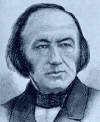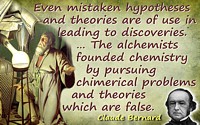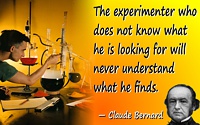 (source)
(source)
|
Claude Bernard
(12 Jul 1813 - 10 Feb 1878)
French physiologist who helped establish the principles of experimentation in the life sciences. His Introduction to the Study of Experimental Medicine (1865) is a scientific classic.
|
Claude Bernard Quotes on Life (8 quotes)
>> Click for 90 Science Quotes by Claude Bernard
>> Click for Claude Bernard Quotes on | Belief | Cause | Discovery | Experiment | Fact | Find | Great | Hypothesis | Idea | Knowledge | Men Of Science | Mind | New | Observation | Phenomenon | Reasoning | Research | Science | Seeking | Statistics | Theory | Truth | Understanding |
>> Click for 90 Science Quotes by Claude Bernard
>> Click for Claude Bernard Quotes on | Belief | Cause | Discovery | Experiment | Fact | Find | Great | Hypothesis | Idea | Knowledge | Men Of Science | Mind | New | Observation | Phenomenon | Reasoning | Research | Science | Seeking | Statistics | Theory | Truth | Understanding |
The constancy of the internal environment is the condition for free and independent life: the mechanism that makes it possible is that which assured the maintenance, with the internal environment, of all the conditions necessary for the life of the elements.
— Claude Bernard
Lectures on the Phenomena of Life Common to Animals and Plants (1878), trans. Hebbel E. Hoff, Roger Guillemin and Lucienne Guillemin (1974), 84.
A physician’s subject of study is necessarily the patient, and his first field for observation is the hospital. But if clinical observation teaches him to know the form and course of diseases, it cannot suffice to make him understand their nature; to this end he must penetrate into the body to find which of the internal parts are injured in their functions. That is why dissection of cadavers and microscopic study of diseases were soon added to clinical observation. But to-day these various methods no longer suffice; we must push investigation further and, in analyzing the elementary phenomena of organic bodies, must compare normal with abnormal states. We showed elsewhere how incapable is anatomy alone to take account of vital phenenoma, and we saw that we must add study of all physico-chemical conditions which contribute necessary elements to normal or pathological manifestations of life. This simple suggestion already makes us feel that the laboratory of a physiologist-physician must be the most complicated of all laboratories, because he has to experiment with phenomena of life which are the most complex of all natural phenomena.
— Claude Bernard
From An Introduction to the Study of Experimental Medicine (1865), as translated by Henry Copley Greene (1957), 140-141.
Constant, or free, life is the third form of life; it belongs to the most highly organized animals. In it, life is not suspended in any circumstance, it unrolls along a constant course, apparently indifferent to the variations in the cosmic environment, or to the changes in the material conditions that surround the animal. Organs, apparatus, and tissues function in an apparently uniform manner, without their activity undergoing those considerable variations exhibited by animals with an oscillating life. This because in reality the internal environment that envelops the organs, the tissues, and the elements of the tissues does not change; the variations in the atmosphere stop there, so that it is true to say that physical conditions of the environment are constant in the higher animals; it is enveloped in an invariable medium, which acts as an atmosphere of its own in the constantly changing cosmic environment. It is an organism that has placed itself in a hot-house. Thus the perpetual changes in the cosmic environment do not touch it; it is not chained to them, it is free and independent.
— Claude Bernard
Lectures on the Phenomena of Life Common to Animals and Plants (1878), trans. Hebbel E. Hoff, Roger Guillemin and Lucienne Guillemin (1974), 83.
If I had to define life in a single phrase, I should clearly express my thought of throwing into relief one characteristic which, in my opinion, sharply differentiates biological science. I should say: life is creation.
— Claude Bernard
From An Introduction to the Study of Experimental Medicine (1865), as translated by Henry Copley Greene (1957), 93.
If needed to give a comparison expressing my feelings about the science of life, I would say that it is a magnificent reception room, resplendent with light, which one can only reach by passing through a long and dreadful kitchen.
— Claude Bernard
In Introduction à l'Étude de la Médecine Expérimentale (1865), 23. From the original French, “S’il fallait donner une comparaison qui exprimât mon sentiment sur la science de la vie, je dirais que c’est un salon superbe tout resplendissant de lumière, dans lequel on ne peut parvenir qu’en passant par une longue et affreuse cuisine.” English version by Webmaster using Google Translate. This version has additional context than the customary translation, elsewhere on this web page, that begins, “The science of life is a superb….”
In a word, I consider hospitals only as the entrance to scientific medicine; they are the first field of observation which a physician enters; but the true sanctuary of medical science is a laboratory; only there can he seek explanations of life in the normal and pathological states by means of experimental analysis.
— Claude Bernard
From An Introduction to the Study of Experimental Medicine (1865), as translated by Henry Copley Greene (1957), 146.
The first entirely vital action, so termed because it is not effected outside the influence of life, consists in the creation of the glycogenic material in the living hepatic tissue. The second entirely chemical action, which can be effected outside the influence of life, consists in the transformation of the glycogenic material into sugar by means of a ferment.
— Claude Bernard
Sur le Méchanisme de la Fonction du Sucre dans Ie Foie (1857), 583. Translated in Joseph S. Fruton, Proteins, Enzymes, Genes: The Interplay of Chemistry and Biology (1999), 340.
The science of life is a superb and dazzlingly lighted hall which may be reached only by passing through a long and ghastly kitchen.
— Claude Bernard
From Introduction à l'Étude de la Médecine Expérimentale (1865), translated by Henry Copley Greene, in An Introduction to the Study of Experimental Medicine (1927, 1957), 15. As extracted in John Bartlett and Emily Morison Beck (ed.), Familiar Quotations (1980, 15th ed.), 551.
See also:
- 12 Jul - short biography, births, deaths and events on date of Bernard's birth.
- Claude Bernard - context of quote The alchemists founded chemistry - Medium image (500 x 350 px)
- Claude Bernard - context of quote “The alchemists founded chemistry” - Large image (800 x 600 px)
- Claude Bernard - context of quote The experimenter - Medium image (500 x 350 px)
- Claude Bernard - context of quote The experimenter - Large image (800 x 600 px)
- Claude Bernard - context of quote Make experiments to … control our ideas - Medium image (500 x 350 px)
- Claude Bernard - context of quote Make experiments to … control our ideas - Large image (800 x 600 px)



 In science it often happens that scientists say, 'You know that's a really good argument; my position is mistaken,' and then they would actually change their minds and you never hear that old view from them again. They really do it. It doesn't happen as often as it should, because scientists are human and change is sometimes painful. But it happens every day. I cannot recall the last time something like that happened in politics or religion.
(1987) --
In science it often happens that scientists say, 'You know that's a really good argument; my position is mistaken,' and then they would actually change their minds and you never hear that old view from them again. They really do it. It doesn't happen as often as it should, because scientists are human and change is sometimes painful. But it happens every day. I cannot recall the last time something like that happened in politics or religion.
(1987) -- 


